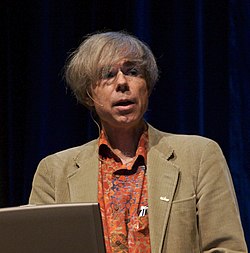Douglas R. Hofstadter Quote
If one keeps climbing upward in the chain of command within the brain, one finds at the very top those over-all organizational forces and dynamic properties of the large patterns of cerebral excitation that are correlated with mental states or psychic activity…. Near the apex of this command system in the brain…. we find ideas. Man over the chimpanzee has ideas and ideals. In the brain model proposed here, the causal potency of an idea, or an ideal, becomes just as real as that of a molecule, a cell, or a nerve impulse. Ideas cause ideas and help evolve new ideas. They interact with each other and with other mental forces in the same brain, in neighboring brains, and, thanks to global communication, in far distant, foreign brains. And they also interact with the external surroundings to produce in toto a burst-wise advance in evolution that is far beyond anything to hit the evolutionary scene yet, including the emergence of the living cell. Who
If one keeps climbing upward in the chain of command within the brain, one finds at the very top those over-all organizational forces and dynamic properties of the large patterns of cerebral excitation that are correlated with mental states or psychic activity…. Near the apex of this command system in the brain…. we find ideas. Man over the chimpanzee has ideas and ideals. In the brain model proposed here, the causal potency of an idea, or an ideal, becomes just as real as that of a molecule, a cell, or a nerve impulse. Ideas cause ideas and help evolve new ideas. They interact with each other and with other mental forces in the same brain, in neighboring brains, and, thanks to global communication, in far distant, foreign brains. And they also interact with the external surroundings to produce in toto a burst-wise advance in evolution that is far beyond anything to hit the evolutionary scene yet, including the emergence of the living cell. Who
Related Quotes
Let my silence grow with noise as pregnant mothers grow with life. Let my silence permeate these walls as sunlight permeates a home. Let the silence rise from unwatered graves and craters left by bomb...
About Douglas R. Hofstadter
